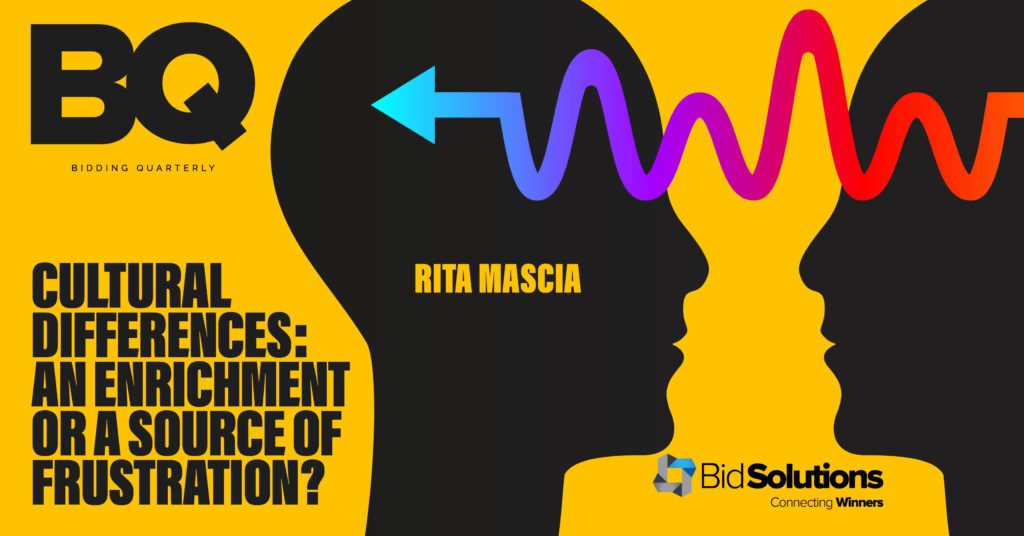
Our brains are wired to recognise patterns and to spot what feels familiar. That’s why we feel comfortable when we belong to a group as we know the rules of engagement.
It’s easy therefore to underestimate the value that cultural differences can bring to bid and client teams.
One reason businesses are so obsessed about having a great organisational culture is to increase collaboration. While culture can be a real asset to a business, often people don’t know how to deal with cultural differences. Or worse, they don’t pay attention to them, alienating colleagues and clients in the process.
Where to start then?
First the language. Using the simplest vocabulary is best whether writing a bid proposal or attending client meetings. While I am a huge fan of idiomatic expressions like “speaking of the devil”, they rarely translate well in other cultures and can often backfire.
Then body language. It is easier for non-native speakers to communicate in writing than on the phone. Alternatively, use Zoom as your colleagues will see your lips moving and they will understand better than on the phone (feedback from a Chinese colleague).
Next, formality vs informality. After 30 years living in the British Isles, I love the informality of first name calling. But I know from my native culture that Italians (and other European nationalities) are not so informal at work. Highly educated subject matter experts like to emphasise their honorifics as opposed to being addressed as just ‘John’ or ‘Emily’.
Hierarchy is also especially important in bid team dynamics where individualistic versus collectivist norms coexist. In more individualistic Western cultures, we expect people in meetings to contribute equally. In Eastern cultures, where respect for age and seniority is key, younger or less senior colleagues may refrain from contributing to a meeting for fear of being disrespectful. If you want everyone in your multicultural team to contribute to your bid strategy meeting, ask them explicitly!
You can also see examples of individualistic vs collectivist cultural differences in the images clients use in their branding. In collectivist cultures like India, a group photo in your bid proposal may resonate better with your Indian client than an image of a single individual. In the West, Nike is a good example of a company which focuses on the individual for their branding, where most pictures are of a single athlete. It matters if you want your bid to look like one your client would write.
Some cultures need more information than others. In Western cultures, when you answer a question, your response tends to expand on the question asked. In other cultures, colleagues may give you narrow answers. Don’t assume that they are uncooperative; in fact, they are being extra polite. Tip: be unambiguous in your instructions.
Cultural differences even affect remunerations. Working in companies with multiple subsidiaries, compensation tends to vary across sites, influenced by business culture/trends in their local markets. In places where the collective is important, salaries tend to be equivalent or based on fixed reward. In more individualistic cultures like the United States, for instance, they value individual performance more than group work. This often translates to small salaries but big bonuses or promotion opportunities for the best performers. Colleagues in sales who are more bonus-dependent tend to engage less with bid managers and their teams, particularly on longer bidding timescales, because their cooperation may not lead to any financial returns for a long time. While you may not have authority to change that, it’s worth bearing in mind to avoid frustrations.
What about religion? Learning the religious affiliations of your team/clients means showing empathy and fostering inclusive bid/client teams. Having a ‘multicultural diversity calendar’ could help with bid scheduling and with celebrating religious cultural diversity.
Sometimes, cultural myopia occurs when two regionally different bid teams collaborate on a proposal. Both teams think their way is ‘the only way’, unable to notice other ways of working. The key for a bid leader is to embrace the best of both worlds, crediting each team for what they do well.
When working with clients from different cultures for whom ‘losing face’ is a no-no, you may not realise this until it is too late. The team are enthusiastic about the client meeting, only to find out later that no deal was agreed. They wonder why because the client team kept nodding and agreeing with them. What happened then? The customer team could not lose face in front of your team because in their culture it would have been considered rude to disagree.
I could go on with more examples but there too many to mention. Instead, I will finish with what worked for me. If you work in multicultural teams, empathy is your best friend. You may come across different behaviours from your multicultural colleagues and clients. None of them are right or wrong, they’re simply different. Ask yourself every time, “Did they mean to be so direct, blunt, evasive, ambiguous, disrespectful, arrogant, passive, ‘replace with your favourite adjective here’?”
Instead, try being curious and fascinated. Ask questions (but not too directly), value your and their uniqueness, and consider yourself lucky to experience so much variety in your work.
So, back to my initial question: Are cultural differences an enrichment or a source of frustration? My answer is: It should be an enrichment, but the reality is often something in between. The cultural differences I have experienced enriched my personal and professional life even though, at times, I may have felt frustrated by them. They acted like a mirror held in front of me that made me uncertain of my own culture (native or acquired by residence). They made me question things I do and things I think, and I have felt enriched in the process.
Cultural diversity is not just about people, it’s also about being able to embrace different ideas. The ‘Culture Club’ is good for everyone, is good for business and is good for the soul.
This article was written by Rita Mascia.
Rita’s journey into the world of bids and proposal started while working for an award-winning language and culture business organisation. Rita is a bid professional with 21 years of experience in the public, private and not for profit sectors. Her expertise in the bid cycle includes business development, capture, bid management, bid writing, and contract negotiations. Her passion lies in leading teams to win business by producing persuasive proposals that deliver what they promise.

